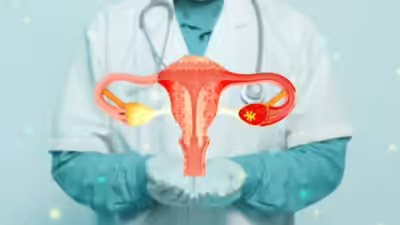

Jessica Gilbert, a 42-year-old mom from Cincinnati, Ohio, was gearing up for a family trip to Disney World when she started feeling under the weather. Initially, she chalked it up to a sinus infection. But after a few days of persistent symptoms and negative COVID, flu, and RSV tests, her doctor ordered blood tests. Despite feeling slightly better, Gilbert was advised to go to the emergency room for further evaluation. There, a doctor delivered the shocking news: I think you have ovarian cancer.
The whole world just stood still, Gilbert told ABC News. I was just totally shocked. [I had] no family history. I didnt know any of the signs for ovarian cancer. I just didnt know anything about it at all.
This unexpected diagnosis was a wake-up call for Gilbert, who had no family history of ovarian cancer and was unaware of its subtle symptoms. Determined to raise awareness, she shared her story, especially poignant during September, Ovarian Cancer Awareness Month. Her message: early detection is crucial, and women should trust their instincts and advocate for their health.
Ovarian cancer: What every woman must know
Ovarian cancer is one of the most serious cancers affecting women in the United States. Often called a “silent killer,” it frequently shows vague symptoms, making early detection difficult. According to the American Cancer Society, thousands of American women are diagnosed with ovarian cancer each year, and awareness is key to improving survival rates.
Early signs of ovarian cancer can be subtle and easily mistaken for everyday issues like bloating, pelvic pain, or digestive discomfort. Women may also experience changes in appetite, frequent urination, fatigue, or unexplained weight changes. Because there is no reliable screening test for ovarian cancer, recognizing these warning signs and seeking medical evaluation promptly is critical.
Risk factors include age (most cases occur in women over 50), family history of ovarian or breast cancer, genetic mutations such as BRCA1 and BRCA2, and certain reproductive factors. Women with these risk factors should discuss preventive strategies with their healthcare provider, including genetic counseling and regular checkups.
Treatment for ovarian cancer depends on the stage at diagnosis and can include surgery, chemotherapy, targeted therapy, or a combination of approaches. Early detection dramatically increases the chances of successful treatment and long-term survival.
Raising awareness about ovarian cancer is essential, especially in the US, where delayed diagnosis is common. Women should prioritize routine gynecological exams, listen to their bodies, and never ignore persistent symptoms. Lifestyle factors, such as maintaining a healthy weight, eating a balanced diet, and staying physically active, may also help reduce overall cancer risk.
By staying informed, recognizing early symptoms, and seeking timely care, women can take proactive steps to protect themselves from ovarian cancer.
For clarifications/queries, please contact Public Talk of India at:
+91-98119 03979 publictalkofindia@gmail.com

For clarifications/queries,
please contact Public Talk of India at:

